Tales from Loire
Loire's natural wine rebels: Blot, Robinot, Bain, Puzelat, Bernaudeau, Joly. Plus cork taint, last-minute replacements, and an Armenian gate-crasher.

Sometimes fate writes better stories than we could plan. This tasting began as an exploration of the Loire's natural wine revolution. Seven bottles were carefully selected to showcase the region's most philosophical vignerons, those who treat wine as a dialogue between earth and cosmos rather than mere agricultural products. But wine, being alive, had other plans.
Two bottles arrived corked: Jean-Pierre Robinot's Nocturne 2021, brought through our organised delivery network from the EU with no possibility of replacement, and Stephane Bernaudeau's Les Nourrissons 2019, thankfully sourced locally from Garage, who offered Les Coqueries as a substitute. Cork taint respects no philosophy - it strikes conventional and natural wines alike. Any serious tasting organiser must adapt - replace when possible, pivot when necessary, and always keep the experience alive. I rushed to Sabotage for a Clos du Tue-Boeuf Pineau d'Aunis 2023 to at least introduce the grape Robinot's Nocturne would have showcased, and accepted Garage's suggestion of Bernaudeau's Coqueries.
Then came the surprise. One participant smuggled in Van Ardi Reserve Areni 2021 from Armenia, insisting we taste it blind alongside these Loire legends. Nothing to do with our planned journey, not even natural wine technically, but the gesture captured something essential. The spirit of discovery that drives any good tasting. Sometimes the best moments come from unexpected detours.
We began with Domaine de la Taille aux Loups' Triple Zéro Rosé. At the end, someone pulled out their Triple Zéro blanc - "Let's finish where we started." Sure, why not? The symmetry worked. Between these sparkling bookends: Loire's most stubborn producers. The ones who'll declassify entire vintages rather than add sulfur. The ones who wait three years for fermentation to finish because that's what the wine needs. The ones who make 2,000 bottles when they could make 20,000.
What follows is both technical documentation and philosophical exploration. These aren't just wines; they're liquid manifestos from vignerons who chose the harder path - farming with horses instead of tractors, waiting years for fermentation to complete naturally, and accepting smaller yields for greater truth. In an age of instant gratification, they practice radical patience. In a world of technological solutions, they trust ancient wisdom.
The Loire Valley became a natural wine cradle not by accident but through necessity. Its marginal climate, diverse terroirs, and distance from established power structures created space for revolution. These producers - Blot, Robinot, Bain, Puzelat, Bernaudeau, Joly - didn't just make wine differently; they reimagined what wine could be when freed from industrial constraints.
So pour yourself something honest, preferably with a bit of funk and sediment, and join this exploration. Understanding these wines requires more than technical knowledge - it demands openness to imperfection, patience with evolution, and recognition that the most profound experiences often come from accepting what is rather than demanding what should be.
Loire Natural Wine Movement: Context and Evolution
The Loire Valley emerged as the natural wine's epicentre through a unique convergence of affordable land, marginal climate requiring careful farming, diverse terroirs across 87 appellations, and distance from established power structures. Pioneers like Joly (1970s), Olivier Cousin, and the Carrogets established foundations emphasising minimal intervention, terroir expression, and organic/biodynamic farming as prerequisites.
Pineau d'Aunis, documented since 1183 AD and favoured by Henry Plantagenet, exemplifies the movement's revival of forgotten varieties. This pepper-scented grape thrives on balanced clay-sand-gravel soils, expressing terroir clearly through sensitivity. Natural producers favour carbonic maceration for enhanced fruit, native yeasts, and minimal sulfur, creating light-bodied wines with high acidity served slightly chilled.
Chenin Blanc demonstrates natural winemaking's transformative potential across Loire appellations. From Savennières' austere schist expressions ageing 4-5 years to develop honeyed complexity, through Vouvray's limestone-driven spectrum from dry to sweet, to Montlouis' mineral precision, natural producers employ native yeasts, extended lees contact, minimal sulfur, and multiple harvest passes to capture optimal ripeness without technological manipulation.
The movement now encompasses 30% of Loire vineyards farmed sustainably or organically (6,488 hectares by 2017), attracting young producers through accessible land prices and freedom to experiment. Technical innovations blend tradition with selective modernity: concrete eggs for fermentation, amphora ageing, and pétillant naturel production demonstrate evolution while maintaining philosophical purity.
These Loire natural wine producers represent more than alternative winemaking - they embody a return to wine as a living expression of place, season, and human collaboration with nature, creating bottles that challenge, evolve, and ultimately transcend conventional quality metrics through authentic terroir expression.
Domaine de la Taille aux Loups: Revolutionising Montlouis
Domaine de la Taille aux Loups, established by the late Jacky Blot in 1988, transformed Montlouis-sur-Loire from Vouvray's shadow into a world-class appellation. Blot, who passed away in May 2023, leaves a legacy now continued by son Jean-Philippe Blot and technical director Christophe Mesliand across 25 hectares in Montlouis plus holdings in Vouvray.
Triple Zéro Rosé NV
- Region
- France » Loire » Touraine AOC
- Type
- rose ancestral sparkling, brut nature
- Producer
- Wine
- Vintage
- NV
- Grapes
- Cabernet Franc
- Alcohol
- 13
- Volume
- 750 mL
- Find at
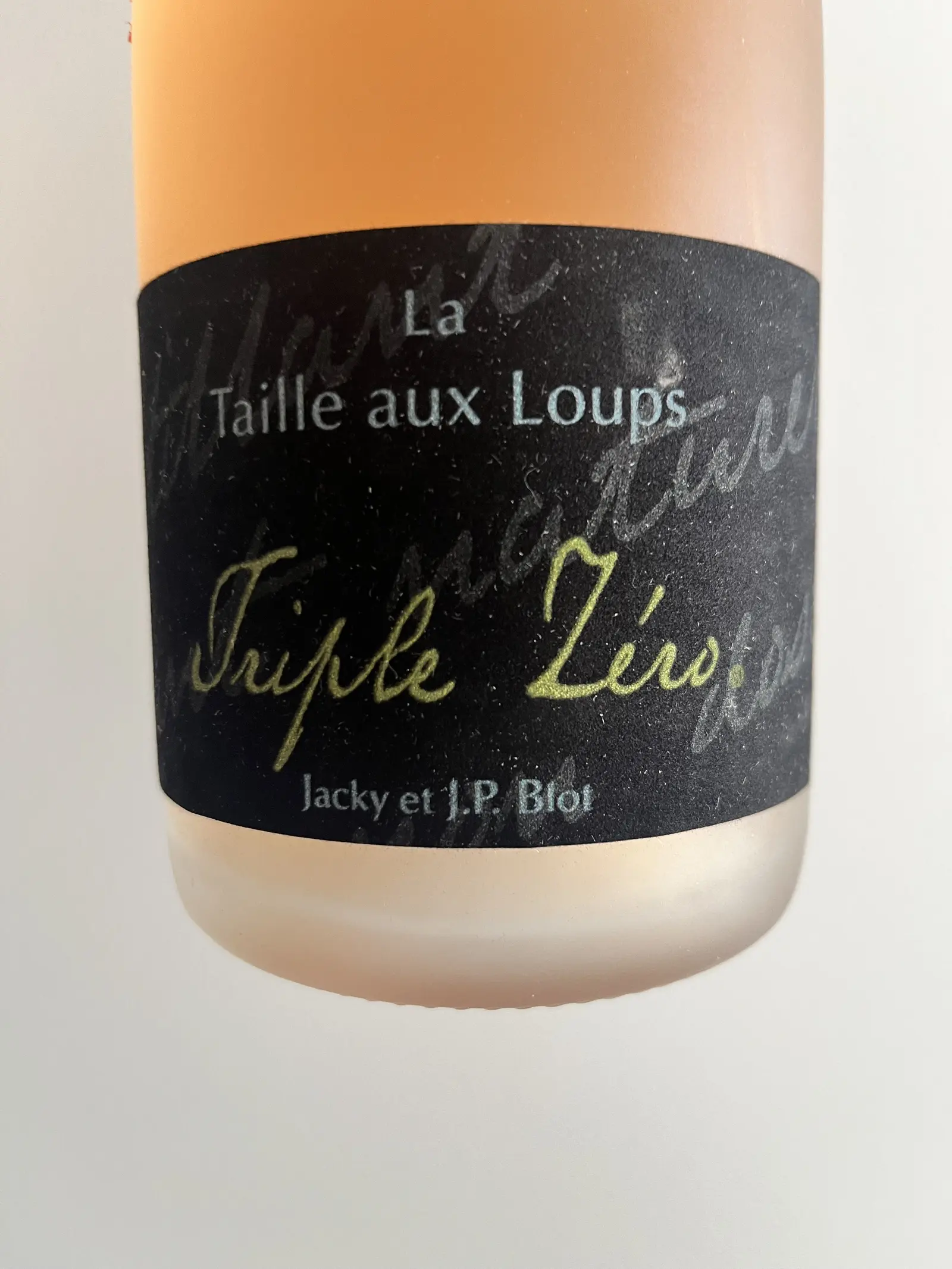
This wine secured the 🏅 7th place in our wine tasting lineup.
The estate's revolutionary Triple Zéro method represents a radical departure from traditional sparkling wine production. This méthode ancestrale eliminates three conventional interventions: zero chaptalisation (no sugar addition to base wine), zero liqueur de tirage (no sugar/yeast mixture for second fermentation), and zero dosage (no sweetening liqueur before final corking). The result achieves a crystal-clear sparkling wine at 3 bars pressure through disgorgement, unlike traditional pét-nat. Base wines ferment with indigenous yeasts from grapes harvested slightly riper to ensure sufficient natural sugar, creating bone-dry sparkling wines at 12.5-13.0% ABV after extended lees ageing.
Proper yeasty stuff here - all fresh bread and tart red berries dancing on clean, high acid. The mousse starts promisingly but doesn't quite stick around for the full show. That oxidative finish saves it though, adding complexity where depth is missing. It's playing in the shallow end when it could've gone deeper, but fuck me if it isn't delicious anyway.
Montlouis sur Loire Clos Michet 2016
- Region
- France » Vin de France
- Type
- white still, dry
- Producer
- Vintage
- 2016
- Grapes
- Chenin Blanc
- Alcohol
- 13
- Volume
- 750 mL
- Find at
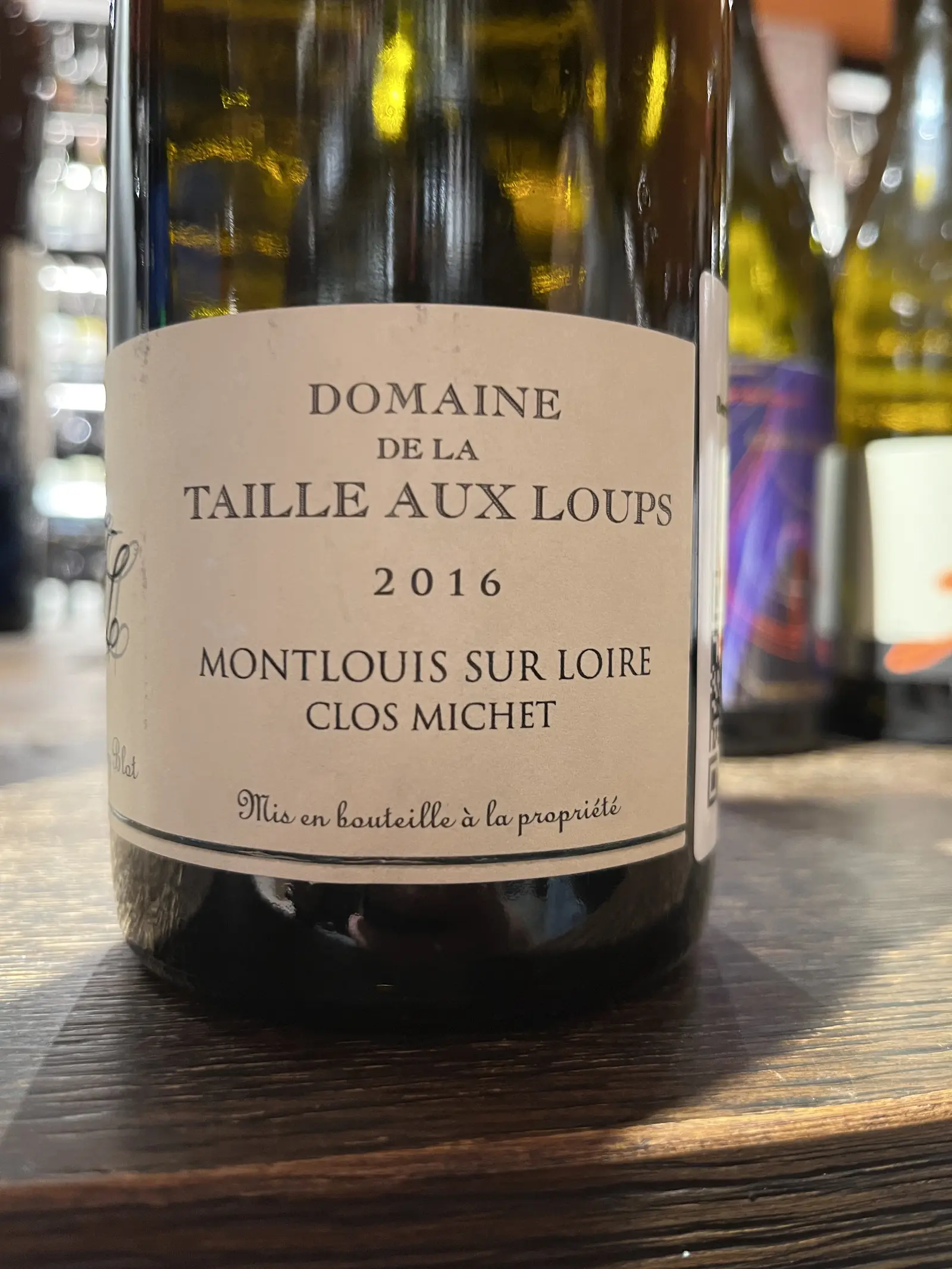
This wine secured the 🥉 3rd place in our wine tasting lineup.
The Montlouis sur Loire Clos Michet 2016 exemplifies Blot's "School of Montlouis" philosophy. From 50+ year-old vines on sandy soils over tuffeau limestone in Saint-Martin-le-Beau, the 2016 vintage survived severe April frosts that devastated 70% of the crop. Vinification follows Burgundian techniques: pneumatic pressing, indigenous yeast fermentation in oak barrels (20% new), no malolactic fermentation to preserve acidity, and extended lees ageing with bâtonnage. The estate farms organically (certified since 2012) with biodynamic elements, achieving radically low yields of 25 hl/ha through severe pruning and selection.
Lanolin meets wet stones, honey-bruised apples with a hint of cinnamon. Chalky texture that turns oily in the finish, all quince jam and persistence. Still vibrant after nine years, multilayered and properly delicious. This is exactly why you cellar Taille aux Loups instead of popping them on arrival. The depth that emerges with time? Worth every year of waiting.
Domaine de la Taille Aux Loups Triple Zéro NV
- Region
- France » Loire » Montlouis AOC
- Type
- white ancestral sparkling, brut nature
- Producer
- Wine
- Vintage
- NV
- Grapes
- Chenin Blanc
- Alcohol
- 13
- Volume
- 750 mL
- Find at
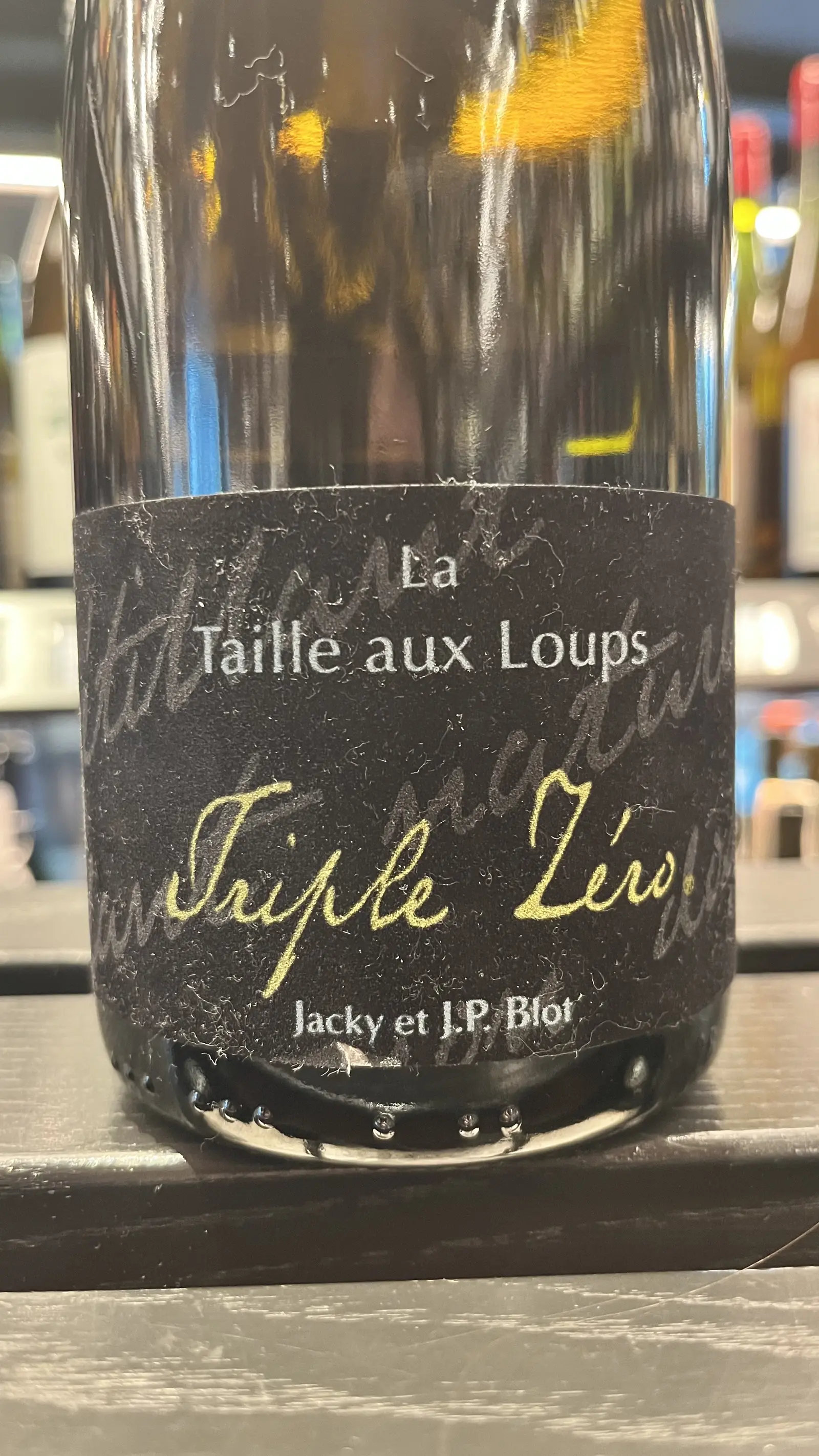
This is delicious. Toasted bread, candied lemon, sage, with bruised quince and cider notes. Beautiful creaminess cuts through pure chenin minerality, while the bubble stays delicate but stimulating. Long finish with just enough bitterness, all wrapped in subtle wood that brings everything together. The profile deceives - this ancestral method sparkler mimics traditional wines with a complexity it "should not" have. Always a success.
Jean-Pierre Robinot: The philosophical extreme of natural winemaking
Jean-Pierre Robinot's journey from Paris wine bar owner (L'Ange Vin, 1980s) and co-founder of influential magazine "Le Rouge et Le Blanc" to Loire vigneron represents natural wine's philosophical apex. Operating Les Vignes de L'Ange Vin in Chahaignes since 2001, Robinot cultivates 7-10 hectares across Jasnières and Côteaux-du-Loire appellations on mixed clay, limestone, and silex soils.
Robinot's winemaking pushes boundaries through extreme patience and zero intervention. Completely sulfur-free since 2006, his wines undergo spontaneous fermentation lasting 2-4 years (sometimes up to 10) in ancient limestone caves beneath his vineyards at constant 10-12°C temperatures. This patient approach creates wines that "vibrate with energy" through controlled oxidation via varied barrel top-up rates. Annual production reaches approximately 20,000 bottles when wines achieve natural balance.
l'ange vin Nocturne 2021
- Region
- France » Vin de France
- Type
- red still, dry
- Producer
- Vintage
- 2021
- Grapes
- Pineau d'Aunis
- Alcohol
- 11
- Volume
- 750 mL
- Find at
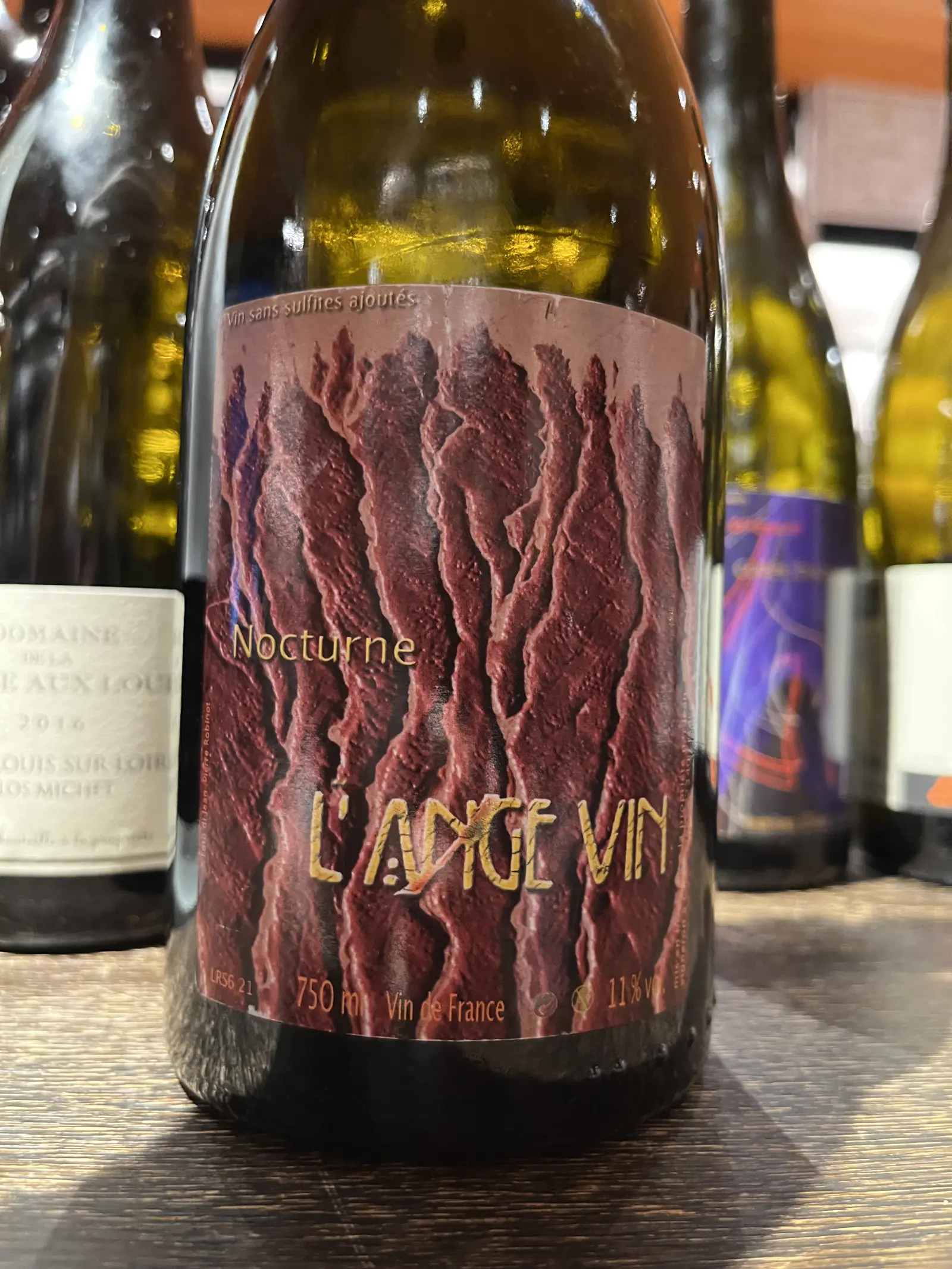
L'Ange Vin Nocturne 2021 showcases 100% Pineau d'Aunis from 80-year-old vines on calcareous soils. At 11% alcohol, the wine underwent spontaneous fermentation with native yeasts, ageing in old oak without sulfur additions.
l'ange vin cuvée bistrologie 2021
- Region
- France » Vin de France
- Type
- white still, dry
- Producer
- Vintage
- 2021
- Grapes
- Chenin Blanc
- Alcohol
- 12
- Volume
- 750 mL
- Find at
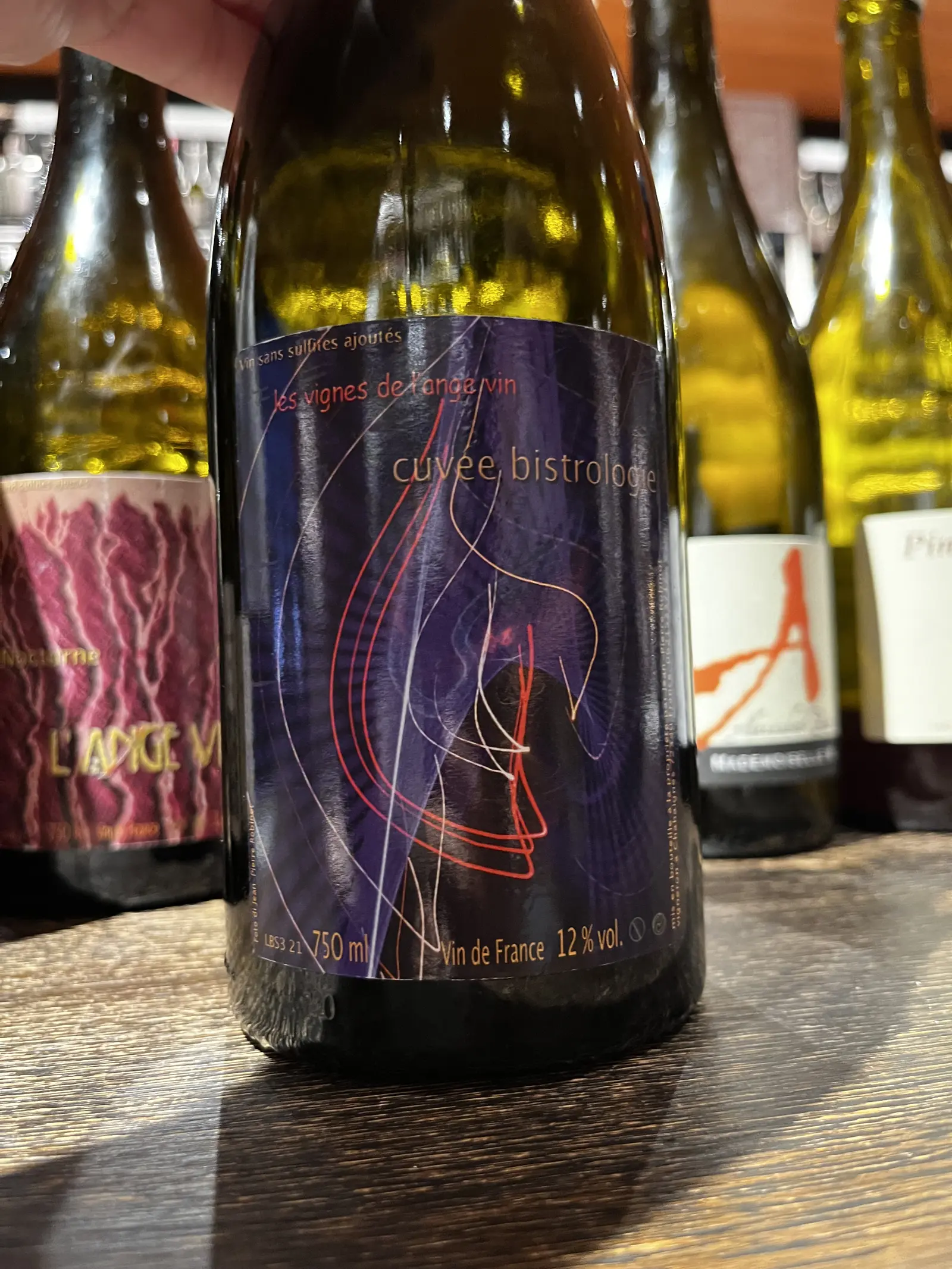
This wine secured the 🏅 4th place in our wine tasting lineup.
The Cuvée Bistrologie 2021 expresses 100% Chenin Blanc from yellow silex, clay, and limestone soils, developing what admirers call "champagne without bubbles" character through extended sur lie ageing, creating hazelnut-oxidative edges balanced with salinity.
Chamomile, halva, raw hazelnuts, honey, dried apples, pomelo zest, and the whole dried tropics cabinet. Absolutely electric stuff with salt-laced acidity that pierces like an arrow. Those oxidative notes promise complexity but the oily texture doesn't quite deliver. Alpine herbs and smoke add tension, keeping things balanced if less thrilling than previous encounter with this label. Classic Robinot roulette - you never know which version you'll get.
Alexandre Bain: Biodynamic precision meets emotional expression
Alexandre Bain established his domain in 2007 at Tracy-sur-Loire, bringing radical natural winemaking to Pouilly-Fumé. After training in Beaune and experiences across Loire, California, and Ventoux, Bain returned to cultivate 11 hectares of Sauvignon Blanc using Percheron draft horses named "Phénomène" and "Risette." Certified organic and biodynamic since inception, his vineyards are split between Portlandian limestone (8 hectares), producing round, warm wines and Kimmeridgian limestone (3 hectares), yielding structured, mineral expressions.
Mademoiselle M 2019
- Region
- France » Vin de France
- Type
- white still, dry
- Producer
- Wine
- Vintage
- 2019
- Grapes
- Sauvignon Blanc
- Alcohol
- 13.8
- Sugar
- 2
- Volume
- 750 mL

This wine secured the 🏅 6th place in our wine tasting lineup.
Mademoiselle M 2019, named after Bain's daughter born during harvest, represents his pinnacle achievement. From Kimmeridgian limestone with marl and oyster fossils, this zero-sulfur Sauvignon Blanc undergoes 36 months total ageing - 18 months in used oak barrels followed by 18 additional months. Hand-harvested at full maturity (often with botrytis), the wine ferments spontaneously in 600L foudres with extended lees contact, producing 13-13.8% alcohol. Single racking on a full moon precedes unfiltered, unfined bottling.
Bain's wines diverge dramatically from conventional Pouilly-Fumé through late harvesting (2 weeks after regional average), creating richer, more aromatic wines with complex oxidative character. His legal battle with INAO (2014-2017) over appellation rights highlighted tensions between traditional systems and innovative natural approaches, ultimately winning the right to use the Pouilly-Fumé designation while many wines remain labelled Vin de France by choice.
Bruised apple, candied fruit, canned pineapple, caramel, nuts, iodine. And it's so tasty. Salt and iodine lace through deep mineral structure, while high acidity stays tightly composed - cushioned by creaminess and hazelnut roundness. Everything feels deliberate here, nothing out of place. Long, engaging, absolutely packed with flavour. This is what happens when restraint and indulgence find perfect balance.
Clos du Tue-Boeuf: Champions of forgotten Loire varieties
The Puzelat brothers transformed their medieval estate (documented since Francis I) into a natural wine beacon. Jean-Marie took control in 1990, joined by Thierry in 1994, converting to organic farming in 1996. Following Jean-Marie's 2018 retirement, Thierry continues with daughters Zoé and Louise across 10-16 hectares in Cheverny on clay with flint over Blois limestone.
The estate's influence extends beyond production - both brothers taught at Amboise viticultural school before dismissal for promoting natural techniques. Their négoce operation (established 2003) supports like-minded organic growers, producing 15 additional cuvées following identical natural protocols, allowing exploration of varieties beyond estate plantings.
Pineau d'Aunis 2023
- Region
- France » Vin de France
- Type
- red still, dry
- Producer
- Wine
- Vintage
- 2023
- Grapes
- Pineau d'Aunis
- Alcohol
- 11.57
- Sugar
- 0
- Volume
- 750 mL

As founding members of the natural wine movement alongside Marcel Richaud and Dard & Ribo, the Puzelats champion indigenous varieties, particularly Pineau d'Aunis. Their 2023 vintage sources from neighbour Valérie Forgues' 100+ year-old vines on clay, sand, and silica soils. Direct pressing (not carbonic) leads to spontaneous fermentation with indigenous yeasts, ageing 10 months in used demi-muids and Burgundy pièces with regular bâtonnage. At 11.5% alcohol with minimal sulfur (13 mg/L total), the wine expresses Pineau d'Aunis' signature pepper and red berry character.
Pretty good for something this young. Overripe berries, cornelian cherry, raspberry - all bright fruit and zero pretension. Goes down dangerously easy, super fruity and vibrant without trying to be anything more. Uncomplicated glou glou at its finest.
Stephane Bernaudeau: Microscale perfection in natural Chenin Blanc
Bernaudeau's path began with a "temporary" job at Ferme de la Sansonnière under Mark Angéli, lasting 15-20 years and shaping his entire philosophy. Establishing his domaine in 2000 while continuing with Angéli until 2015, Bernaudeau now cultivates just 3 hectares near Martigné-Briand, where Anjou Noir meets Anjou Blanc.
Working exclusively with horse-drawn ploughing and achieving yields of 25hl/ha, Bernaudeau practices biodynamic viticulture following Triple A principles.
Production remains microscopic - "a few thousand bottles" annually - creating cult status among natural wine enthusiasts. Wines achieve "sublimely-textured" density through reductive winemaking that flatters concentrated fruit, requiring contemplation and rewarding patience with extraordinary ageing potential.
Les Nourrissons 2019
- Region
- France » Vin de France
- Type
- white still, dry
- Producer
- Wine
- Vintage
- 2019
- Grapes
- Chenin Blanc
- Alcohol
- 13.5
- Volume
- 750 mL
- Find at

Les Nourrissons 2019 comes from a 0.7-hectare parcel planted in 1910, purchased from Eric Calcutt. This 97% Chenin Blanc, 3% mysterious Verdelho undergoes direct pressing, natural fermentation in used oak, and 16 months ageing on lees without fining or filtration.
Les Coqueries 2019
- Region
- France » Vin de France
- Type
- white still, dry
- Producer
- Wine
- Vintage
- 2019
- Grapes
- Chenin Blanc
- Alcohol
- 13
- Sugar
- 2
- Volume
- 750 mL

This wine secured the 🥇 1st place in our wine tasting lineup.
Les Coqueries 2019, from newly acquired Bonnezeaux hillside parcels on schist and quartz, produces "lightning sharp Chenin" with bright salinity contrasting Les Nourrissons' power.
Apple vinegar, pastilla, linden, white flowers. Medical notes, citrus, calendula with chamomile. A bit shy on the nose but then - gorgeous. The mouthfeel is perfectly balanced, with a saline frame that stretches forever. Quaffable yet multilayered, mineral and complex. Salty. Spicy. Beautiful oak integration that never dominates. This is what happens when everything just clicks.
Nicolas Joly and Coulée de Serrant: Biodynamic viticulture's global ambassador
Nicolas Joly abandoned investment banking in 1977 to transform his family's Coulée de Serrant into biodynamics' most famous vineyard. This 7-hectare monopole, cultivated since 1130 by Cistercian monks, holds its own AOC on steep schist slopes overlooking the Loire. Converting to biodynamics in 1984 after discovering Rudolf Steiner's agricultural lectures, Joly treats the vineyard as a "self-perpetuating ecological whole" influenced by cosmic forces.
Joly's influence extends globally through Renaissance des Appellations (175 members from 13 countries) and 18+ published books. His wines polarise - requiring intellectual engagement over immediate pleasure - but demonstrate authentic terroir expression through "living wines" improving over decades. Over 600 Demeter-certified vineyards worldwide trace their inspiration to his pioneering work.
Clos de la Coulée de Serrant 2017
- Region
- France » Loire » Savennières-Coulée-de-Serrant AOC
- Type
- white still, dry
- Producer
- Vintage
- 2017
- Grapes
- Chenin Blanc
- Alcohol
- 15
- Volume
- 750 mL
- Find at

This wine secured the 🥈 2nd place in our wine tasting lineup.
His practices integrate all biodynamic preparations (500-508) applied according to lunar cycles, with animals (cows, horses, sheep, bees) contributing to biodiversity. The Clos de la Coulée de Serrant 2017 exemplifies his approach: multiple harvest passes over 3-4 weeks selecting fully ripe Chenin Blanc (often with beneficial botrytis), spontaneous fermentation lasting 2-4 months, aging 6-8 months in neutral 500-liter oak with minimal racking, no fining or filtration, producing approximately 20,000 bottles at 13-14% alcohol.
Yellow leaves, fruit tree resin, honey, cognac notes, raisins, wool, little mushrooms, stone fruits. Four hours of decanting was a good idea, and could've gone longer even. The acidity sits lower than expected, with dried fruit sweetness and a touch of bitterness keeping things interesting. Completely unique wine, and this time around it clicked beautifully. Two years ago I didn't get it.
Van Ardi: Armenian innovation meets Loire natural wine sensibilities
Founded in 2008 by former California CPA Varuzhan Mouradian, Van Ardi represents Armenia's wine renaissance from 1,050-meter volcanic vineyards in Aragatsotn.
Reserve Areni 2021
- Region
- Armenia » Armenia
- Type
- red still, dry
- Producer
- Wine
- Vintage
- 2021
- Grapes
- Areni Noir
- Alcohol
- 14
- Volume
- 750 mL
- Find at
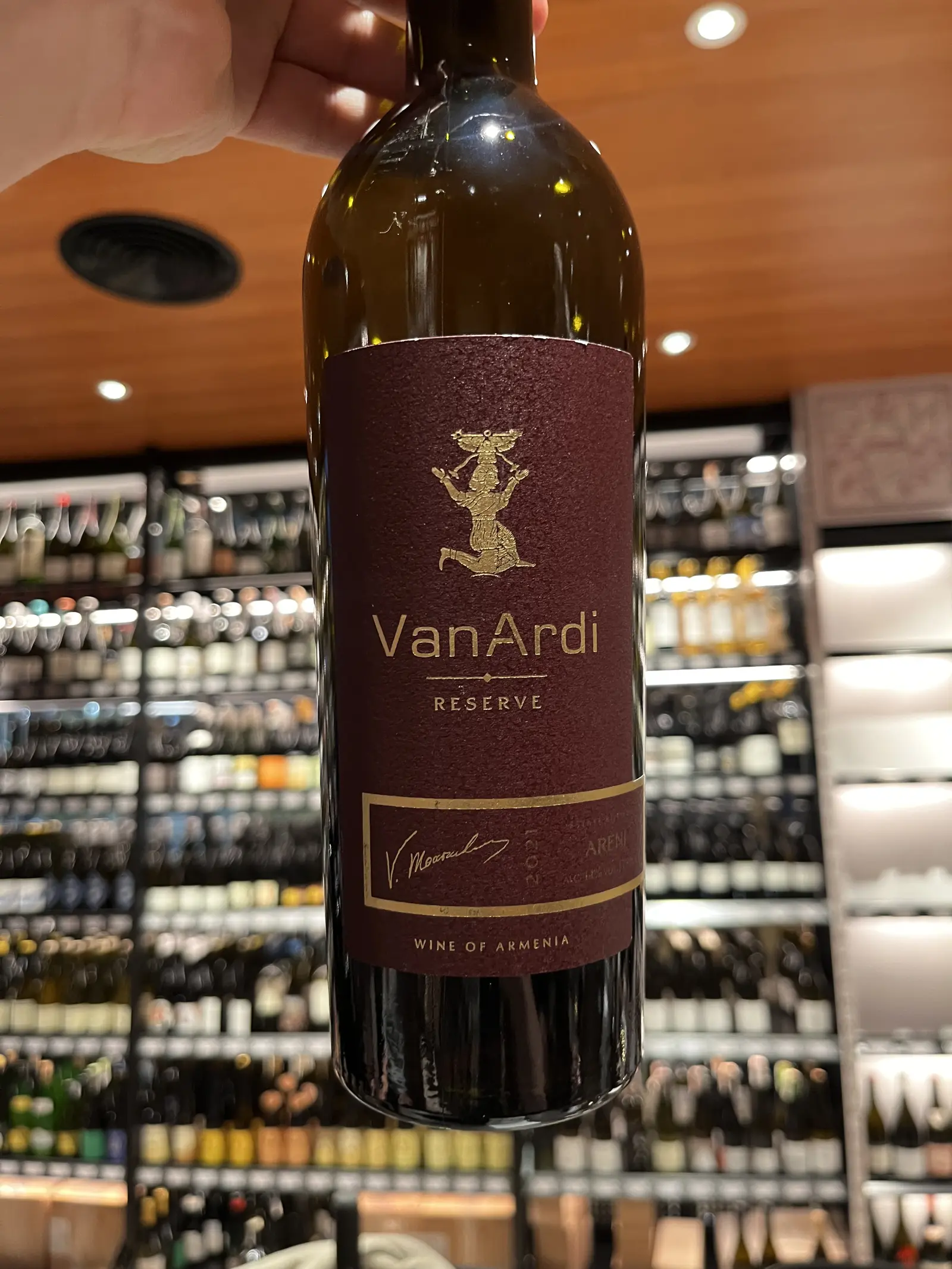
The Reserve Areni 2021 showcases indigenous Areni Noir - a 6,000-year-old variety with no genetic connections to other grapes - from phylloxera-free vines on rocky volcanic sandstone.
Hand-harvested and sorted, the wine undergoes minimal intervention with indigenous yeast fermentation in stainless steel, ageing 12-14 months in Armenian and French oak. Certified organic through Ecoglo, the estate practices biodynamic elements, including sound therapy via bell tower playing classical and Armenian music to the vines.
This Armenian expression bridges ancient heritage (Areni-1 cave winery dates to 4100 BC) with modern natural wine philosophy, offering Loire enthusiasts parallel expressions of volcanic minerality, high acidity, and artisanal production, emphasising terroir authenticity over technological manipulation.
Guessed Areni as a joke - then it actually was. Strong pomegranate-blood aromatics, like narshаrab, with dark cherries and spices. Not particularly complex but properly good drinking. Touch too green though, some stem inclusion that initially had me thinking Georgia. Full-bodied yet missing depth somehow. Still, pretty cool wine.
Resources & References
- Wine-Searcher: Technical data on grape varieties and producer profiles
- Wikipedia: Historical context on Loire appellations, grape varieties, and biodynamic viticulture
- Imbibe Magazine: "Why is the Loire Valley the cradle of France's natural wine movement?"
- SevenFifty Daily: "The Making of a Biodynamic Winemaking Icon" (Nicolas Joly profile)
- The Art of Eating Magazine: Triple Zéro methodology documentation
- Wine Spectator: Loire Valley producers and Nicolas Joly profiles
- Les Caves de Pyrene: Clos du Tue-Boeuf producer information
- Vine Trail: Stéphane Bernaudeau technical specifications
- National Geographic & Smithsonian Magazine: Armenian wine history and Areni grape origins
- Various producer websites and importer technical sheets for specific vintage information